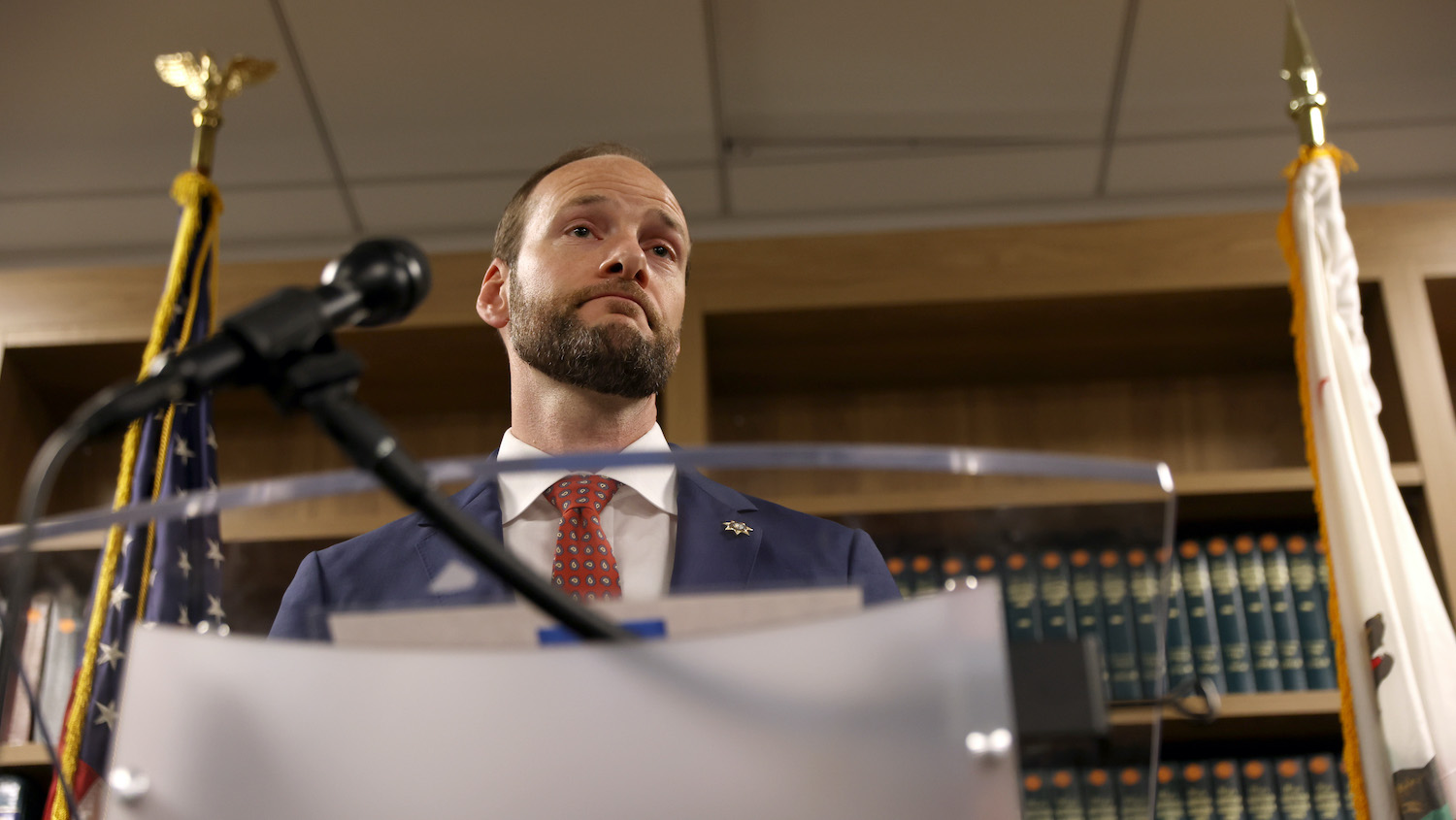On Tuesday, 74,335 San Franciscans successfully voted to recall Chesa Boudin, the city's reformist district attorney. To hear the local and national right-wingers gleefully spiking the football tell it, the defenestration of the city's DA by 60 percent of the mere 26 percent of citizens who turned out to vote this year was an unambiguous rebuke of Boudin's softness on crime, specifically his enthusiastic sanctioning of open-air fentanyl markets for the city's population of unhoused people. Boudin's story is told, in both the overtly partisan version and the view-from-nowhere mainstream one, as a tale of a progressive warrior disentangled from reality, tilting at windmills like structural racism and greedy landlords while his actual constituents face the omnipresent threat of violent crime—or, worse, having their commute sullied by the sight of an unwashed poor.
To tell the story in that way, it helps to have no understanding of how money and power are actually wielded, in this city and this country. It helps, too, to ignore the fact that all that influence is in the hands of people very much like Nellie Bowles—elites who have a vested interest in a vile and untenable status quo, and so have every incentive to misread what is actually happening here.
Bowles is a former New York Times tech reporter who left the paper last year to contribute to her wife Bari Weiss's newsletter, writing takes such as Kyle Rittenhouse Was The Real Victim and The Crime Wave Is Real Because Someone Stole My Car (That I Left The Keys Inside Of). If you need someone to misread a story in a grandiose and perspective-light way, you could do a lot worse. And, right on time, here she is in The Atlantic, with a long story pegged to the Boudin recall, entitled "How San Francisco Became A Failed City." If you had already accepted the notion that San Francisco is indeed a failed city and wanted to read a story addressing the causes, I unfortunately cannot recommend this story, as it is chiefly concerned with propping up the only real latter-day Bowles take: people with progressive politics have pushed too far in the name of woke culture war, and have made things worse for everyone because they are out of touch with reality. This is not a novel analysis, and the story itself is not an especially energetic or insightful expression of it, but Bowles's San Francisco bona fides are legit, in the sense that she is a sixth-generation descendant of one of California's most dynastic families, one that still wields significant water, land, and oil rights.
Anyway, here is the crux of her argument:
Because yesterday, San Francisco voters decided to turn their district attorney, Chesa Boudin, out of office. They did it because he didn’t seem to care that he was making the citizens of our city miserable in service of an ideology that made sense everywhere but in reality. It’s not just about Boudin, though. There is a sense that, on everything from housing to schools, San Francisco has lost the plot—that progressive leaders here have been LARPing left-wing values instead of working to create a livable city. And many San Franciscans have had enough.
The Atlantic
It is worth getting into exactly who Boudin is and what he's done while in office. Boudin, the son of two former Weather Underground members, is a former public defender who took the plurality of votes in a low-turnout ranked choice election in 2019, defeating an appointee of the mayor's office by a vanishingly slim margin, and thanks in large part to a shambolic campaign by the establishment. He ran and won on a platform of reforming the broken justice system, in part by ending cash bail, emphasizing rehabilitation over carcerality and taking aim at the rich people that have turbocharged San Francisco's stunning inequality. Because of that last bit, the movement to recall him quite nearly preceded his ascension into office in Jan. 2020. The city requires the signatures of just 10 percent of its electorate to trigger a recall, something of a local special, which, combined with his narrow victory in the first place, meant Boudin was always going to be extremely vulnerable. The recallchesa.org URL was registered before he even took office.
Boudin's actual performance as the DA was not really the crux of this recall. Boudin's policies have consistently polled better than Boudin the person, and though he's been held back by a mayor's office dead set on kneecapping him and thwarted by a wildly recalcitrant SFPD, he has done a lot of the things he said he would. He has also done some less popular things. Boudin faced serious heat when he did not pursue upgraded hate crime charges against suspects implicated in a handful of anti-Asian hate crimes. Boudin's office did pursue hate crime charges against 17 other suspects, but the narrative that he was not taking the attacks seriously enough crystallized and persisted, and Asian-American voters turned against him in the recall election. You will also likely not be surprised to learn that Boudin did not succeed in ending structural injustice in his two years in power.
Again, though, that doesn't really matter, or anyway is immaterial to why he was recalled. That part was about the unstoppable narrative that Boudin's leniency towards criminals and people forced to sleep on the street had made San Francisco an ugly, dangerous place. This is central to Bowles's argument, such as it can be said to exist. She spends the first part of her blog talking about homelessness, which has nothing to do with the DA but is telling when it comes to assessing the broader, vibe-based complaint she lays out. For Bowles, it is as if homelessness is not just something that correlates with crime, but is itself a crime; the issue, as Bowles sees or feels it, is somehow not about housing, but woke permissive attitudes to drug abuse. Also, all of this is the DA's fault.
If you’re going to die on the street, San Francisco is not a bad place to do it. The fog keeps things temperate. There’s nowhere in the world with more beautiful views. City workers and volunteers bring you food and blankets, needles and tents. Doctors come to see how the fentanyl is progressing, and to make sure the rest of you is all right as you go.
[...]
Fentanyl is a national catastrophe. But people addicted to drugs come from all over the country in part for the services San Francisco provides. In addition to the supervised drug-use facility in the plaza, San Francisco has a specially sanctioned and city-maintained slum a block from City Hall, where food, medical care, and counseling are free, and every tent costs taxpayers roughly $60,000 a year. People addicted to fentanyl come, too, because buying and doing drugs here is so easy. In 2014, Proposition 47, a state law, downgraded drug possession from a felony to a misdemeanor, and one that Boudin said he wouldn’t devote resources to prosecuting.
The Atlantic
This line of logic, popularized by the hilariously failed gubernatorial candidate Michael Shellenberger, is a fraught one, and requires its adherents to believe that homelessness and the inability to afford to live in a home are somehow not connected, or at least less salient than the individual failings of all those unhoused people themselves. (Per a survey, 70 percent of the city's unhoused population became homeless while already living in San Francisco and did not flock to the city because of its permissive policies.) To Bowles, housing only enters into the equation as a shaky line drawn between a Black Lives Matter sign in a $3 million house and someone sleeping in the alley 50 feet away; to the extent that she understands any of it, it is as a series of choices. Some are good, some are bad, and all of them exist in a context-free vacuum.
That homelessness is a problem with causes or drivers is never really considered. If there's a housing crisis in San Francisco, the 17th-largest city in the country, it is not because of the mountains of cash accrued by the region's new oligarch class and the historic demographic shift that followed. It is, instead, a matter of more Bad Choices—the "banjo-and-beehives utopian fantasy" of far-left NIMBYs who oppose new housing because new buildings "might risk blocking an inch of their view of the bay." For someone whose family has owned property quite literally since the city's inception, Bowles has a pretty shaky understanding of what the home ownership class in San Francisco looks like. Still, it's more thought than she gives to those without homes.
This idle and unreasoned conflation between 1) rich people operating with their class interests at heart and 2) the marketing material that says San Francisco is a bastion of leftist thought is at the core core of Bowles's piece. She seems obsessed with the idea that progressive crusaders have seized meaningful power and are using it, against the will of the people, to enact doctrinaire pro-crime policies; they made this choice because they read too much critical race theory, maybe, or just because of their fealty to various trendy ideologies. "[San Francisco] became so dogmatically progressive that maintaining the purity of the politics required accepting—or at least ignoring—devastating results," Bowles writes, failing utterly to show her work. Boudin is the only progressive lawmaker Bowles names, and he gets blamed for a mountain of issues that have nothing to do with him. The machine politics-ass mayor London Breed, on the other hand, wields an inordinate amount of power and gets praise for being a "canny politician who knows which way the wind is blowing." (This canniness is demonstrated by such boldly progressive acts as sitting out Pride in solidarity with the SFPD.) It's all very much in the vein of blaming "rising crime rates" on a defunding of the police that never actually happened.
If it seems strange to blame the DA and only the DA for problems so obviously outside of his purview, it is because it is in fact very strange to do that. But it is not hard to know why it happened: a good deal of the anger towards Boudin is the product of a well-funded and highly coordinated media campaign that, like any successful campaign of that kind, didn't just push a narrative but create its own emotional reality. The New York Times chalked up Boudin's ouster to high crime rates even though any serious statistical inquiry would show that violent crime is down in the city and property crimes are around the same (high) levels they've been at for a decade. Bowles briefly acknowledges that reality before returning to the parallel and much more dire one in which her story unfolds by veering into the viral plight of Walgreens, which closed a bunch of SF stores because they overextended themselves on some real estate deals and then blamed the closures on shoplifting and Prop 47. The entire recall campaign was framed in this way—it turned on "concerns over rising crime," which is not the same as rising crime. If Bowles was interested in parsing why everyone thinks there's a crime wave when there is not in the pages of The Atlantic, she could have read all about it in, well, The Atlantic:
A “crime wave” wave has overtaken the media. Mentions of the phrase more than doubled from 2019 to 2021 in major U.S. print publications, according to Nexis data; the number of minutes the big cable-news networks spent on it increased exponentially. A slew of studies show that individuals form their ideas about the prevalence of crime by following the news. Perhaps people think there’s a crime wave because they keep hearing about a crime wave.
The Atlantic
Breed and her cohort of tech-serving San Francisco politicians found a convenient sin eater in Boudin, and some willing partners in the people who funded his recall. That the city's Democratic machine and the ultra-rich libertarians behind the recall might not agree on the fine points of policy didn't matter at all; agreeing on a target was enough.
The story of a recall is not one of progressives ruining a city, but of rich people banding together across ideological lines to preserve their class status. A DA who sets out to lift the boot squishing poor people into oblivion is naturally going to face some resistance from the people wearing that boot. The recall campaign pulled in $7.2 million, more than twice what the opposition raised, with serious money coming from the real estate lobby, rich tech people like Garry Tan, the billionaire heiress of the Levi Strauss foundation, and Republican megadonor William Oberndorf. All that money doesn't buy a recall on its own, as San Francisco's voters had to do the actual ousting of their DA. What that money did buy, though, was both the narrative and the wherewithal to make it ubiquitous through politicians and media outlets willing to push it. Consider, by contrast, the recent scandal in which the SFPD refused to give the DA's office a vehicle to repossess a store full of stolen goods, forcing Boudin's office to rent a U-Haul. The cops in San Francisco, who spent big against Boudin, have spent two years refusing to do their jobs even as their budgets swell and the mayor sings their praises. The city's police department acted like an unaccountable protection racket and successfully wielded its influence to sabotage a DA, but the U-Haul scandal hardly made news. It was the wrong sort of crime.
Bowles, London Breed, and the San Francisco Police Department all got what they wanted on Tuesday. Unfortunately for the latter two, they will now have to either start doing their jobs or find someone else to blame for their fuckups. Nellie Bowles, for her part, will be fine.






